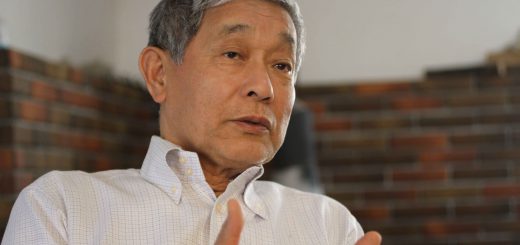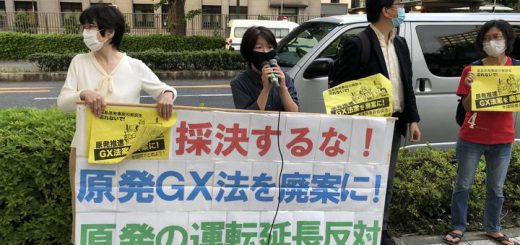Statement: Toward a New Era in which the people Choose the Energy
May 5, 2012
NPO Citizens’ Nuclear Information Center
Today, May 5, is Children’s Day.
Children’s Day is a holiday on which we celebrate our hope for the healthy growth of the next generation.
Just exactly on this day, the last operating nuclear reactor, the Hokkaido Electric Power Company’s Tomari Nuclear Power Plant Unit 3 will be shut down for a scheduled inspection. Thus all 50 of Japan’s nuclear reactors (Fukushima No.1 Power Plant Units 1 to 4 were officially decommissioned on April 19, 2012) will be in a state of shutdown today.
From today we will be able to live without depending on electricity produced from nuclear fission. This will show that it is possible for the mechanisms of society to run perfectly well without nuclear power. This is a day that will be recorded in history and remain long in our memories.
The great earthquake and tsunami of March 11, 2011 took the lives of 20,000 people in the three prefectures of Miyagi, Iwate and Fukushima. Moreover, the accident at the Fukushima No.1 Power Plant scattered large amounts of radioactive materials into the environment, causing the loss of people’s livelihoods, their houses, their food, their health, their lives and sundered the bonds between people. Having forced people into fear and anxiety, even now, although more than a year has passed since the accident, more than 150,000 people have no option but to live in evacuation centers with no hope of a resolution in sight.
It has become abundantly clear to anyone who looks that life and nuclear energy are incompatible.
Discovered by scientists in 1938, the phenomenon of the nuclear fission of uranium was quickly applied to the atom bombs that were dropped on Hiroshima and Nagasaki. Later, the generation of electricity by atomic power was introduced under the name of “atoms for peace.” The series of nuclear accidents at Three Mile Island, Chernobyl and Fukushima, however, tell us that in fact “atoms for peace” is not possible. We have been repeatedly told that safety is the first priority, but this has not been realized in practice. We must not repeat again the mistake of accepting the one-sided propaganda that has claimed for the last half-century that nuclear energy is a dream energy that we are capable of controlling.
Despite the fact that the Fukushima accident is not yet clearly understood, approval for a restart of Ohi Nuclear Power Station’s units 3 and 4 on the basis of the stress test’s primary evaluation shows that the government remains unrepentant over the Fukushima nuclear accident. The Fukushima nuclear accident represents the wholesale collapse of the criteria for judging the safety of nuclear power stations. How can further catastrophes be avoided unless this state of affairs is rectified?
By leading our lives without reliance on nuclear power through this coming summer, when the peak of power demand will occur, we can now show that the abolition of nuclear power plants is a realistic possibility. How we produce the energy that is one of the bases of our society is a matter that is open to choice. The situation now is totally different from that of the last half-century, in which nuclear power was the source of dreams. How much of what kind of energy is necessary and how we will use it in the society we envisage for the future, for the next generation, is something we think the people should decide for themselves.
We sincerely hope to bequeath to our children a country in which all can live in safety.
Let us work together to abolish nuclear power!


